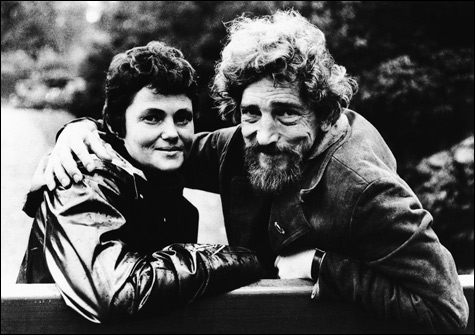
CLASSICS: Henning Mankell, Michael Ondaatje, and Michael Connelly agree that Sjöwall and Wahlöö wrote “the first great series of police thrillers.” |
| Roseanna and The Man Who Went Up In Smoke | By Maj SjöwAll and Per Wahlöö | Vintage Crime | 224/192 pages | $13.95 each |
Maj Sjöwall and Per Wahlöö's Martin Beck mysteries are back in a fourth American printing. The first two — Roseanna and The Man Who Went Up In Smoke — are out now, and the next two will appear in the spring. There are 10 novels in all, making up what the poet wife and the journalist husband titled "The Story of Crime." The series first appeared in the years 1965–1975 (Wahlöö died in 1975), a period of intensifying violence among Sweden's criminals — violence subtly linked by Sjöwall and Wahlöö to America's war on Vietnam. Not a great leap, since many Americans who refused the draft settled in Sweden, and Swedes actively protested the war.The Martin Beck novels are exceptional fiction and will especially please readers of Henning Mankell (he contributes an introduction to Roseanna), whose own series of 10 Kurt Wallander novels is now complete. Mankell, Michael Ondaatje, and Michael Connelly agree that Sjöwall and Wahlöö wrote, in Ondaatje's phrase, "the first great series of police thrillers."
In the genre, the Martin Beck novels are "police procedurals," which is not a form of crime fiction at which American writers excel. We love the shamus, the private eye, the knight or lone wolf, the one good man in what W.H. Auden called "the Great Wrong Place": Raymond Chandler's Philip Marlowe, Connelly's Hieronymus Bosch, Lee Child's Jack Reacher. Marlowe and Reacher have been policemen; now they operate outside the law, natural enemies of authority. Bosch is still a cop, but he's at odds with his higher-ups and stubbornly goes his own way. Chief Inspector Martin Beck, by no means an organization man, is, like Kurt Wallander, part of a team. The moral vision of Sjöwall and Wahlöö sees essential value in the men and women who pursue criminals in our violent world. Remember Augusto Pinochet and the Spanish judge who had him arrested on a London street.
Beck is a brilliant interrogator who throws himself into his cases. His marriage suffers from his single-mindedness; then, like Wallander's, it ends. (Marlowe and Reacher are bachelors; Bosch has been married but is wedded to what can only be termed his calling.) Beck is also, like Wallander, the sort of investigator who notices small things and operates on instinct. At some point in most of the novels he puts the pieces together, sees what others have not seen, and acts. He is less a hero than a man born to do what he is doing. It's impossible to imagine him living any other sort of life.
 Related
Related:
Review: The Book of Eli, Review: The Mother, Review: The Secret In Their Eyes, More 
- Review: The Book of Eli
In a post-Apocalyptic landscape of ash and destruction infested by slack-jawed cannibal gangs with carious grins, a man walks resolutely toward the sea, bearing with him the light of humanity.
- Review: The Mother
A girl is found murdered in this latest effort from Korean director Bong Joon-ho, and the police, at a loss, pin the blame on Do-joon (Bin Won), a childlike local with not much going on upstairs, alternately brutalizing and bamboozling him into a confession.
- Review: The Secret In Their Eyes
The Counterfeiters (Austria) won in 2008, Departures (Japan) triumphed in 2009, and in 2010 the Best Foreign Language Film Oscar went to this piece of crap from Argentina.
- Review: Watchmen
When Watchmen concentrates on violence, it comes alive. When it meanders into metaphysics, which it does frequently and at length, it loses its way.
- Conscientious objectors
How do people become fanatics? When does individual conscience take a stand?
- Review: The Taking of Pelham 1 2 3 (2009)
This meticulously detailed update of the 1974 cult-favorite heist drama retains some of that film's taut pacing and dry humor, and it even boasts some decent performances.
- Photos: Bonnaroo 2009
Bruce Springsteen, Wilco, Elvis Costello, and more at Bonnaroo 2009 in Manchester, Tennessee
- Review: The Kindly Ones
Those put off by the soft-pedaling of the SS in the movie adaptation of Bernhard Schlink's The Reader might be wary of Jonathan Littell's memoir of fictional war criminal Maximilien Aue.
- Review: Dollhouse
Joss Whedon continues to fight the darkness
- Cheap thrills
They say Dr. Lakra got his pen name from the doctor’s bag he carried around when he first began tattooing, two decades ago. “Lakra” puns on the Spanish word “lacra,” meaning scar or blemish, but it’s also slang for “delinquent” or “scumbag.”
- Nobel Son
On its surface, this quirky thriller from Randall Miller has indie-style appeal, with Alan Rickman in a delicious role as a gluttonous, philandering, narcissistic physics professor whose Nobel Prize win is deflated by the kidnapping of his rebellious philosophy-major son.
- Less

 Topics
Topics:
Books
, Crime, Organized Crime, Hieronymus Bosch, More  , Crime, Organized Crime, Hieronymus Bosch, James "Whitey" Bulger, Raymond Chandler, Augusto Pinochet, Michael Ondaatje, Lee Child, Michael Connelly, Kurt Wallander, Less
, Crime, Organized Crime, Hieronymus Bosch, James "Whitey" Bulger, Raymond Chandler, Augusto Pinochet, Michael Ondaatje, Lee Child, Michael Connelly, Kurt Wallander, Less 